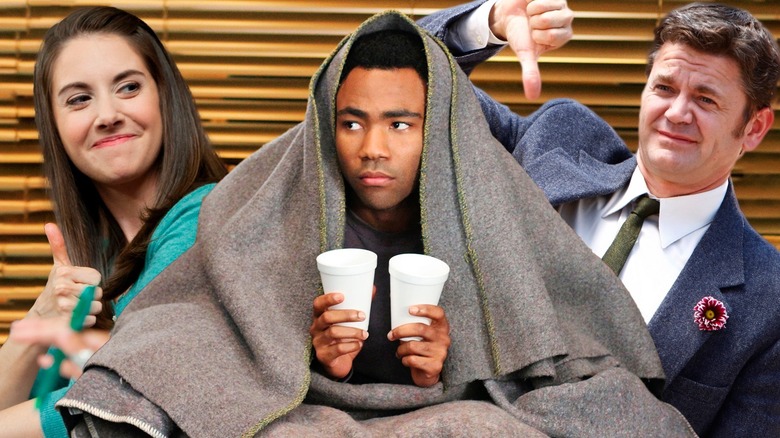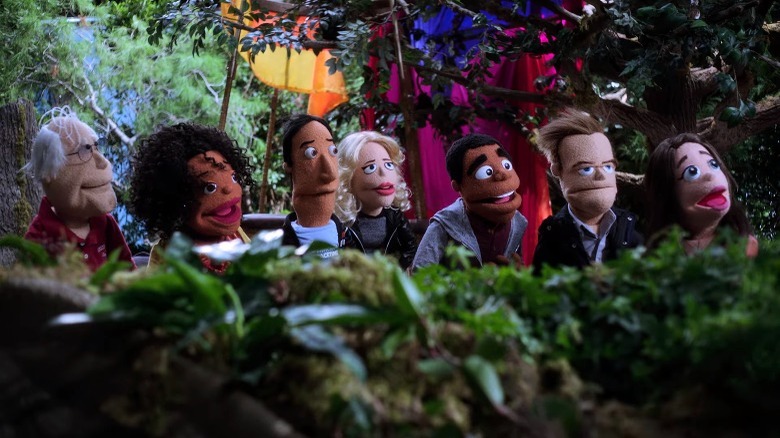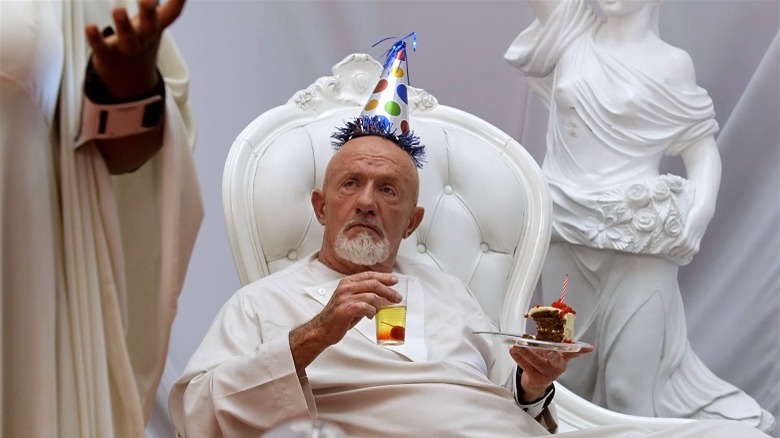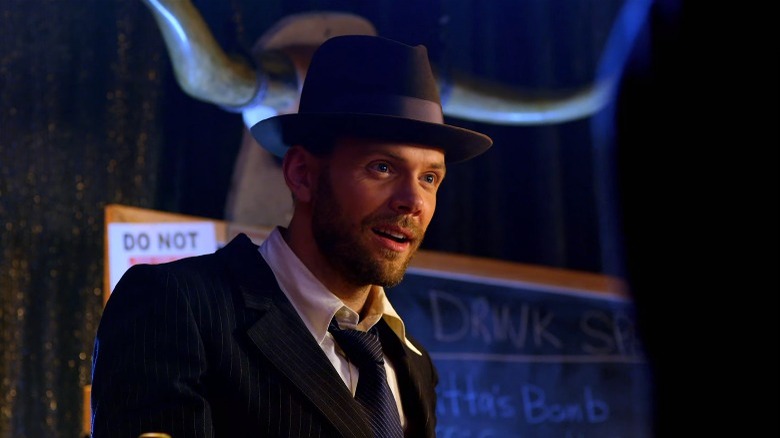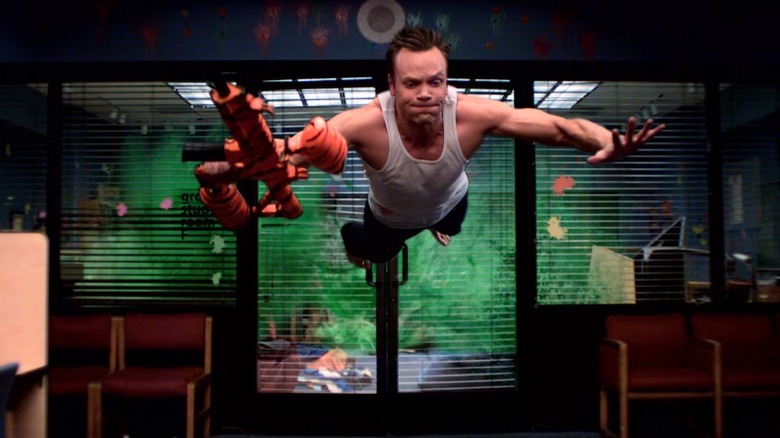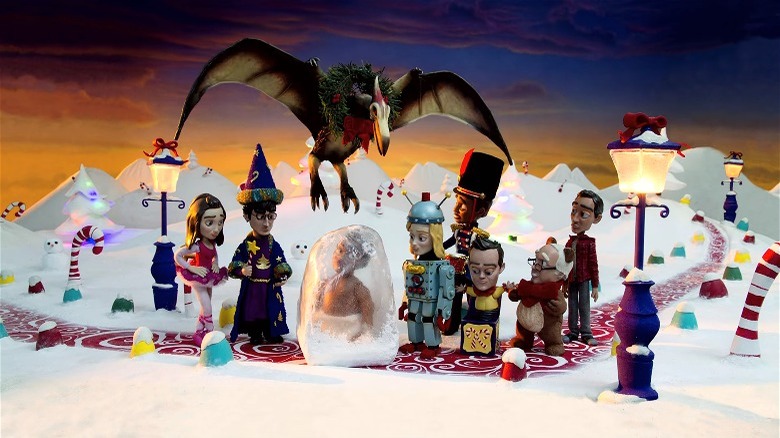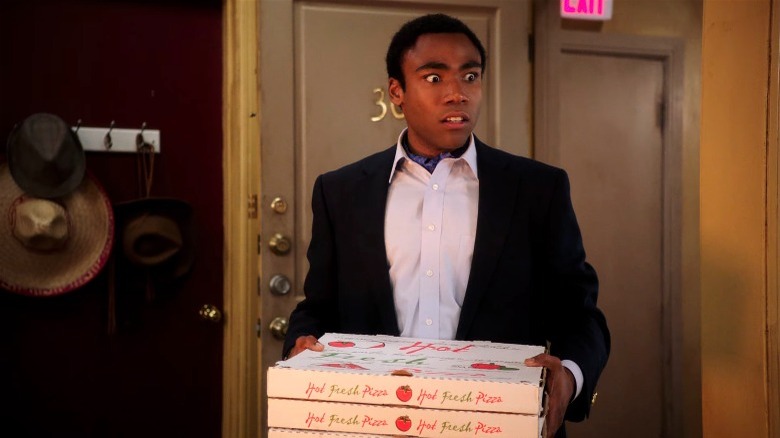Every Season Of Community Ranked Worst To Best (Including The Gas Leak Year)
In the second season of "Community" — NBC's underdog sitcom about a group of friends at a mystifyingly quirky community college — Abed (Danny Pudi) becomes obsessed with a little-seen NBC superhero show called "The Cape." Protesting against the insistence of Jeff Winger (Joel McHale) that the show is about to be canceled, Abed insists that he needs "The Cape" to continue for "Six seasons and a movie!" The phrase would become a rallying cry for "Community" devotees, desperately hoping that the sitcom, which often found itself making headlines for its lackluster ratings, would find a way to continue.
The show did ultimately make it to six seasons, and years after it went off the air, a movie was finally announced in 2022. Details are still scarce and the participation of certain actors remains up in the air, so a lot of fans may be revisiting the original run of the show so they can hang out with Abed, Jeff, Britta (Gillian Jacobs), Troy (Donald Glover), Annie (Alison Brie), Shirley (Yvette Nicole Brown), Pierce (Chevy Chase), Dean Pelton (Jim Rash), Señor Chang (Ken Jeong), and all the rest of the colorful characters who filled the halls of Greendale Community College. And, come on, who can forget Magnitude (Luke Youngblood)? Pop pop!
But: which seasons of "Community" are worth a rewatch? Read on for a look back at the comedy as we rank every season from worst to best, including the gas leak year.
6. Season 4
Mere days after "Community" was renewed for a fourth season, series creator Dan Harmon was fired from his job as showrunner. The resulting season — later referred to as "the gas leak year" when Harmon returned the next year — easily ranks as the show's weakest. The thing is, a lot of its problems were likely unavoidable no matter who was steering the ship. After all, people don't tend to go to community college ad infinitum, so the show struggled to justify its continued existence as a series about people taking classes together. Whereas early seasons took place almost entirely at Greendale, Season 4 features a number of episodes that took the study group outside the school, to varying levels of success. "Conventions of Space and Time," which brings the cast to an Inspector Spacetime fan convention, is fun enough; "Intro to Felt Surrogacy," which imagines the cast as puppets, might be the show's single worst episode.
Perhaps the most unforgivable aspect of Season 4 is its insistence on bringing Ken Jeong's Señor Chang into the friend group. He spends the season suffering from "Changnesia," unable to remember his former past as a Spanish professor. He acts less and less like a real human being with each passing moment, merely a vehicle for ridiculous, shoehorned-in "Chang" puns that grow increasingly annoying. Like the show itself, Chang seemed to be wearing out his welcome in Season 4. Thankfully, the show would right the ship the following year.
5. Season 5
If Season 4 struggled to prove its worth, Season 5 revealed that "Community" could (and should!) continue despite some major cast shakeups. This season saw the departure of both Chevy Chase and Donald Glover; Pierce was killed off in the first few episodes of the season, while Troy left on a boat trip around the world with his hero LeVar Burton. Pierce's death led to the excellent episode "Cooperative Polygraphy," wherein the study group takes lie-detector tests in order to receive what they had been bequeathed by Pierce in his will. Troy's departure happens in the subsequent episode, "Geothermal Escapism," which turns the Greendale campus into a giant game of The Floor is Lava. It's a delightful episode full of classic "Community" shenanigans, tied to some real heart, specifically the friendship between Troy and Abed.
Furthermore, whereas Season 4 floundered trying to justify staying at Greendale, Season 5 finds things for the characters to do. Jeff Winger's teaching gig makes total sense for him, and the Save Greendale Committee allows the characters to stay involved with the school even though the Study Group no longer fits.
The best episode of the season and quintessential "Community," is "App Development and Condiments." An app that allows people to rate each other spirals out of control until MeowMeowBeenz hysteria grips the entire school. Alliances form; Greendale is transformed; the zany nonsense just keeps building and building until the illusion shatters and everyone goes back to their normal lives. Classic Greendale.
4. Season 6
Numerous factors went against "Community" in Season 6. Longtime regular Yvette Nicole Brown departed, and introducing new characters to replace old favorites is always risky. Oh, and NBC canceled "Community," instead airing it on the blink-and-you-missed-it streaming service Yahoo! Screen. Thankfully, despite everything, Season 6 is pretty decent! Even lackluster "Community" bests most other shows, and Season 6 delivers enough highlights to land it thoroughly in the middle of this ranking.
Brown was missed, but Paget Brewster's new character, Frankie Dart, added a welcome dynamic to the Save Greendale Committee's campaign. Keith David's Elroy Patashnik especially succeeds, filling the "ornery older man" role left open by the departures of Chevy Chase and Season 5's Jonathan Banks as Buzz Hickey. Even Ken Jeong's Chang — far from the greatest character — mellows out and actually proves enjoyable in a handful of episodes devoted to Chang's budding acting career.
Series finales are difficult to pull off, but the final episode of "Community" — "Emotional Consequences of Broadcast Television" — closes everything out in stellar fashion. In typical timeline-splintering "Community" fashion, Abed imagines futures for everyone should "the show" be renewed. Always a character who struggled with accepting change, he often turned to pop culture as a means of coping. Many "Community" viewers could relate, and it touches the heart to see Abed come to terms with the uncertainty of life. Now bring on the movie!
3. Season 1
The first few episodes of any sitcom are usually a little rocky, as a show tries to find its footing, figure out who its characters are, and determine what kinds of jokes they will deliver. For that reason, revisiting the first part of "Community" Season 1 can be jarring; these don't feel like the characters we would come to know and love. Jeff was way more of an a**hole at the beginning, for example; Troy was a mere dumb jock. Still, those early episodes work anyway, because they were always funny. Check out the iconic "That's racist!" scene from Episode 6, "Football, Feminism, and You." The writing is whip-smart, and the exchange is delivered with pristine comic timing by McHale and Glover.
All things considered, it's incredible how quickly "Community" found its lane. (I'd be remiss not to point out that this first season had 25 episodes to figure itself out, a number many streaming-era comedies don't even reach several seasons in.) The episode that changed everything is, of course, "Modern Warfare" — the show's first paintball episode. What up until now had been a (better-than-average) network sitcom became an action show for an episode, a pitch-perfect parody of war movies. What often gets memory-holed is that a few episodes earlier, the show began to flex its parody muscles with "Contemporary American Poultry," a spin on mob movies. Over the next few years, "Community" would sometimes lean too hard into these episodes, but the Season 1 examples hold up.
2. Season 2
By "Community's" second season, the show fired on all cylinders. Nearly every single episode ranks as a stone-cold classic, from "Cooperative Calligraphy" – the bottle episode about Annie's lost pen — to "Mixology Certification," which presents the characters off-campus for the first time (to a bar), giving us a chance to see them all in a new light. "Epidemiology" remains a Halloween episode for the ages, trapping the cast in a zombie apocalypse where ABBA plays on a loop. "Advanced Dungeons & Dragons" spins a fantastical tale out of the cast playing a tabletop game, while "Paradigms of Human Memory" assumes the form of a clip show looking back on adventures we never got to see. Troy comes face-to-face with his childhood hero LeVar Burton in "Intermediate Documentary Filmmaking," and "Critical Film Studies" even summons the nerve to parody "My Dinner with Andre." What other show would do a "My Dinner with Andre" parody?
"Abed's Uncontrollable Christmas," one of the most formally-interesting "Community" episodes, also aired this season. While the parody episodes sometimes come off like stylistic exercises, the Claymation Christmas special roots its experimentation in Abed's deep-seated trauma that leads him to lean on pop culture as an escape. It's a perfect mixture of funny and sad, and visually wondrous while also deeply emotional. This is an episode of a show that knows exactly what it is, and one that knows its audience will follow it anywhere.
1. Season 3
How do you top a season of television as inventive as "Community's" second outing? You focus in on the characters, as "Community" Season 3 does. If Season 1 was about figuring out who these people are, and Season 2 was about enjoying the adventures they could have together, Season 3 tries to figure out what they all mean to one another. (While, of course, still having adventures). For that reason, it's even more special than the second season, because this is the point in the show's run where we realize just how much we care about the Greendale gang. This is the season where Pierce's father dies and the group has to play an 8-bit video game for him to get his inheritance. It's the season where Troy and Britta begin their relationship, and it's the season where Annie regrets playing matchmaker, leading to an emotional breakdown inside Abed's "Dreamatorium."
The standout episode of the season — and perhaps the entire show — is Episode 4, "Remedial Chaos Theory." While playing Yahtzee, a simple roll of the dice splits reality into seven timelines, fracturing the group depending on who goes downstairs to get the pizza. The timelines allow us to examine the group's relationships from multiple angles, birthing several iconic gifs in the process. The episode also introduced the phrase "the darkest timeline" into the culture, and in the age of COVID and what feels like a worldwide backslide into fascism, "Community's" outlook has never felt more vital.
